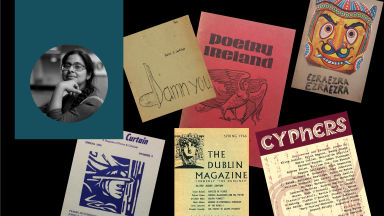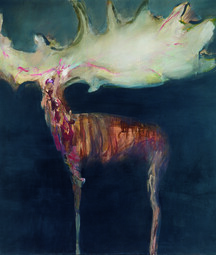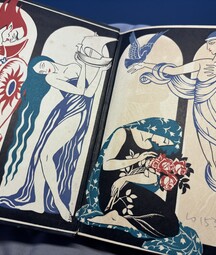However, that excitement is misled.[i] Before the scholar can dream of accessing an archive, the archivist carefully curates and catalogues them. Acknowledging the archivists’ depth of knowledge of literary collections, I am delighted to be partnering with Eoin McCarney at the National Library of Ireland on my research project. I shall draw on Eoin’s and other librarians’ knowledge while pursuing my retrieval project that studies Dublin’s and Bombay’s small press cultures of the 1960s and 70s.
As the inaugural Irish Research Council Enterprise Postdoctoral Scholar at the National Library, I shall work on the ephemera, created during the little magazine movement in the 1960s and 70s Dublin. These short-lived, small-scale, and irregular publications supported practitioners of radical aesthetics, women, and working-class individuals. By focussing on these productions’ architecture, content, dissemination networks, I shall assess how the ephemeral posed resistance to censorship, rapid modernisation of the economy under Seán Lemass and exclusion of women from mainstream literary productions during the two decades covered by the project.
I shall also compare Dublin’s ephemeral productions with Bombay’s little magazines. The two postcolonial cities’ literatures are comparable because they became important centres of cultural production in the twentieth century after they emerged from the shadow cast on them by the British canon. I shall retrieve chance encounters between the Irish and Indian authors in the twentieth century that shall provide visions for the cultures of these two countries to connect.
Since small press productions do not employ gatekeeping measures often connected with large publishing ventures, they more actively attract work by minority community writers and women. In the initial stages of this research, I am studying Cyphers, a magazine edited by Leland Bardwell, Eiléan Ní Chuilleanáin, Pearse Hutchinson and Macdara Woods. The magazine carried connotations of subversiveness with it. Its first poem, ‘Diary’, by Jocelyn Carter, a poet now lost to anonymity, speaks of ‘carry[ing] the children/ Over the hill’ and ‘cremat[…ing] the [written] pages’.[ii] The incompatibility of domesticity and writing marked the experience of many female authors at the time. By inaugurating with a poem that spoke of that experience, the editors (without pronouncing in the editorial, which remained inexistent in Cyphers) communicate a commitment to unrecognised but important experiences in the Irish community. The project shall account for more such measures taken by participants in the field of ephemera to broaden the scope of Irish (and Indian English) poetry.
It is my extraordinary privilege to also be hosted by UCD School of English, Drama and Film where I am being mentored by Dr Lucy Collins. As a firm believer in the significance of a community in successfully conducting research, I look forward to working with scholars at UCD, who are also engaged in pathbreaking research on women and working-class authors’ writing. To name a few, Dr Collins, Dr Anne Mulhall, Professor Porscha Fermanis, Professor Danielle Clarke, Dr Sarah Comyn, Dr Kate Fama, Dr Laura Loftus, and Dr Emma Penny inspire me to work harder.


